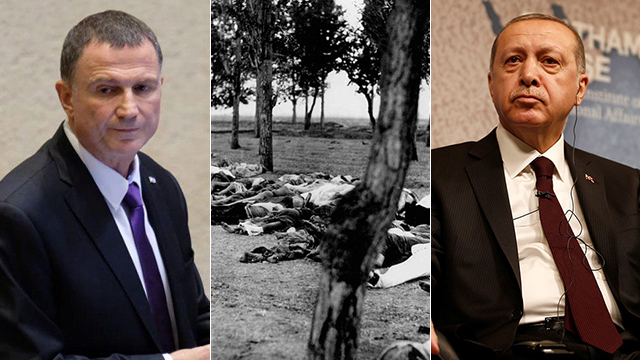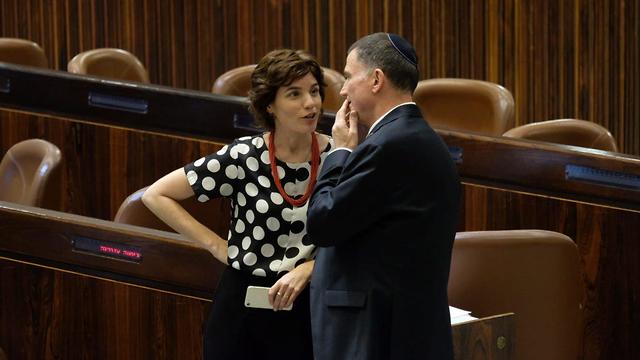

Knesset speaker advocates recognizing Armenian Genocide
Despite diplomatic spat between Ankara and Jerusalem, Yoel Edelstein denies that move to recognize the early 20th-century extermination of 1.5 million Armenians stems from political feud, insists it is morally correct thing to do 'as human beings and Jews’; official recognition hinges on government approval.
It is, Edelstein said during a speech in the Knesset, "the right thing to do as human beings and as Jews."
The Knesset approved a proposal by Meretz leader Tamar Zandberg for an order calling on Jerusalem to recognize the genocide of the Armenian people between 1915 and 1917, with 16 supporting the move, and 10 opposing it in the sparsely-filled chamber.

However, official recognition remains unlikely since it requires the approval of the government,
Edelstein also rejected political voices urging that the recognition be granted solely as a retaliation against Turkish President Recep Tayyip Erdoğan, who in recent days has intensified his rhetoric against Israel against the backdrop of violence on the Gaza border.
"I am ashamed to hear that elected officials and public figures are talking about the recognition of the murder as an 'appropriate Zionist response' to the despicable actions of Turkey after the recent events on the Gaza border," he lamented.
Edelstein continued to attack the notion that something so morally obvious as a recognition of the American historical plight should be granted only to spite the bellicose Turkish president.
"Since when does Ankara appeal to our moral codes? Is history changing according to the nature of relations with a ruler like Erdogan?" he asked.
According to Zandberg, the failure of Israel to recognize the genocide constitutes “a moral stain on the State of Israel and especially since it is due to political interests.”
MK Itzik Shmuli (Zionist Union), who also co-sponsored the bill on the issue, hailed the “important”discussions.
“I constitutes another step toward the goal, but there is no intention of settling just with (the discussions) because the goal is formal recognition,” he said.
“It is not appropriate that the government avoided giving an answer, but in a few days it will in any case have to make a decision because of the law proposal,” Shmuli continued.
Despite extensive historical research into the Ottoman Turks’ extermination of the Armenian population, Ankara disputes the figure of 1.5 million, insisting that it was significantly lower and arguing that the victims died as part of the civil war rather than a systematic murder program.
For years, the sensitive issue has been a focus of Turkey’s foreign policy, with the country applying pressure on countries to refrain from recognizing it as a genocide and imposing sanctions on those who do.
In April 2015, the world marked 100 years since the beginning of what some historians describe as the first holocaust. The same month, Turkey recalled its ambassador from the Vatican after
Pope Francis described it as a genocide.
The European Parliament further sparked Turkey’s anger when it passed a non-binding resolution to commemorate the genocide of the Armenian people.
















